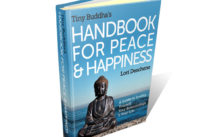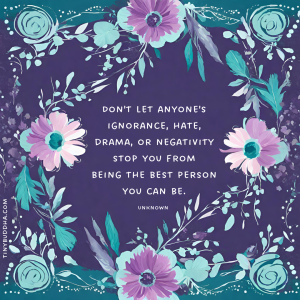
“Stay away from what might have been and look at what can be.” ~Marsha Petrie Sue
When I look back at some of the most painful moments of my life, I see myself sitting alone, feeling either immense shame or regret.
It’s bizarre how we can get so offended and angry when other people hurt us, and yet repeatedly choose to torture ourselves, far worse than they possibly could, through repeated mental rehashing.
For the longest time, my biggest regret revolved around missing out on life.
From a distance, people always thought I had everything going for me. Up close, you could see the cracks in that facade: No matter what I got, I was painfully discontent and depressed, and often isolated in fear.
I remember my last night in NYC at twenty-five, sitting in a tiny boxed-up efficiency studio apartment that I rented in a low-income building. I’d been in the apple for two and a half years, and my greatest accomplishments were barely noticeable to anyone but myself.
Granted, they were big ones: I’d quit smoking, formed a yoga practice, and began the slow uphill climb to liking who I was.
But the list of what I didn’t do often felt far more compelling: I didn’t form many real friendships, I never had a storybook NYC romance like I dreamed about, and I never even once auditioned for a play after growing up on the stage.
I went to NYC to convince the world I was strong, then I broke into a million little pieces and, in stubborn resistance to “giving up,” spent two years trying to glue myself back together.
For a long time I regretted that I went to the city where dreams come true and did absolutely nothing to go after mine. Then I realized something: I was not that girl anymore, and in another second, I would again be someone new.
At any moment I could let go of the weight of who I’d been and allow myself a better chance of becoming who I wanted to be.
What I did or didn’t do could either paralyze me further or motivate me to do something now—something not conceived in reaction to past disappointments but born completely anew from a moment of strength and empowerment.
We can all do that. At any time, you can take your regrets and:
1. Identify and address your weaknesses.
When we acknowledge our weaknesses, there’s often an implied sense of judgment, as if we should never make any mistakes. The alternative is to accept that everyone makes mistakes and then focus on what we can do differently going forward.
For me, that meant discovering why I was so afraid of putting myself out there. The rewards of learning to conquer that fear in the present far outweigh the pain of having given into it in the past.
2. Use your mistake as a teaching tool.
In my time writing for ‘tweens, I read many letters from girls who’ve learned to beat themselves up by watching their parents’ response to mistakes. If you forgive yourself and bounce right back, you empower your children to respond the same way.
If you’re like me and don’t have any children, think of it as helping everyone around you. I know when I see someone fall down and get back up without stressing over what they could have done differently, I feel inspired. It reminds me that it is possible, and I can do it too.
3. Use the opportunity to become better at adapting.
Most big mistakes present instant changes to reality as you know it. When I first arrived in NYC at twenty-two, I got involved in a pyramid scam, thinking it was a shortcut to success, and blew through my savings. What’s worse, I unknowingly pulled other people into a sinking ship that went under, with their money.
I couldn’t believe I’d been so naïve. I couldn’t change what I’d done, but I could take my new set of circumstances and challenges and plan a strategy to get back where I wanted to be. Any time we practice adapting, we create the possibility of happiness that doesn’t depend on perfect conditions.
4. Strengthen your ability to focus on things you can control.
If you cheated on your boyfriend after one too many margaritas, you probably wish you could go back and show more restraint. Unfortunately, what you should have done is now irrelevant. All you can do is move forward from where you are.
This is an invaluable skill because it empowers us to take positive action instead of falling into a shame cycle.
5. Embrace impermanence.
Everything in life is impermanent. While I’m not thrilled when my actions end a relationship or good situation, this reminds me to appreciate everyone and everything in the moment. There are no guarantees in life—even if I make very few mistakes.
6. Evaluate your relationships.
Think of this as your It’s a Wonderful Life moment. You’re down on your luck and vulnerable. You have to do some major life restructuring to rebound from whatever you just experienced. Are your friends there for you, offering forgiveness and support—even if it takes them a little time to get there? If not, this may be a perfect time to remove unhealthy relationships from your life.
This may also give you a chance to strengthen your relationships. If you hurt someone else, take this opportunity to discover what really motivated your actions and then let yourself get vulnerable with them. We’re all human, and nothing brings us together like acknowledging our universal struggles.
7. Get better at accepting responsibility.
I know many people who would sooner donate their organs to science than take responsibility. We’ve all passed the buck at one time or another, because it’s a risk to admit culpability. Still, there’s something empowering about saying, “I screwed up, and I accept the consequences.”
8. Challenge your thinking.
There’s a quote that reads “Success is often the result of taking a misstep in the right direction.” If your mistake propels you toward a better future, then it’s actually a blessing in disguise. I realize mistakes oftentimes present challenges, but ultimately, you can only move forward if you find opportunities in your reality, whatever that may be.
The crazy thing about regret is that it seems imperative sometimes—as if we have to indulge it like a bed we made and now have to lie in. But there’s nothing compelling us to dwell on the way things could have been. The only thing that keeps us stuck in lost possibilities is the refusal to focus on new ones.
Life is now, and we always have a choice: Do we drown in regret over what never came to be, or use our energy to create what can be? Today, I am choosing the latter.
About Lori Deschene
Lori Deschene is the founder of Tiny Buddha. She started the site after struggling with depression, bulimia, and toxic shame so she could recycle her former pain into something useful and inspire others do the same. She recently created the Breaking Barriers to Self-Care eCourse to help people honor their needs—so they can feel their best, be their best, and live their best possible life. If you’re ready to start thriving instead of merely surviving, you can learn more and get instant access here.
- Web |
- More Posts













 Though I run this site, it is not mine. It's ours. It's not about me. It's about us. Your stories and your wisdom are just as meaningful as mine.
Though I run this site, it is not mine. It's ours. It's not about me. It's about us. Your stories and your wisdom are just as meaningful as mine.